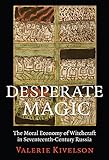Desperate Magic : The Moral Economy of Witchcraft in Seventeenth-Century Russia / Valerie A. Kivelson.
Material type: TextPublisher: Ithaca, NY : Cornell University Press, [2013]Copyright date: ©2013Description: 1 online resource (376 p.) : 16 color illustrations, 29 halftones, 1 table, 1 chart, 2 mapsContent type:
TextPublisher: Ithaca, NY : Cornell University Press, [2013]Copyright date: ©2013Description: 1 online resource (376 p.) : 16 color illustrations, 29 halftones, 1 table, 1 chart, 2 mapsContent type: - 9780801451461
- 9780801469381
- 133.43094709032 23
- BF1584.R9 K58 2016
- online - DeGruyter
- Issued also in print.
| Item type | Current library | Call number | URL | Status | Notes | Barcode | |
|---|---|---|---|---|---|---|---|
 eBook
eBook
|
Biblioteca "Angelicum" Pont. Univ. S.Tommaso d'Aquino Nuvola online | online - DeGruyter (Browse shelf(Opens below)) | Online access | Not for loan (Accesso limitato) | Accesso per gli utenti autorizzati / Access for authorized users | (dgr)9780801469381 |
Frontmatter -- Contents -- List of Maps and Figures -- Acknowledgments -- List of Abbreviations -- Note on Names and Transliteration -- Maps -- Introduction: The Moral Economy of Desperation in Seventeenth-Century Russia -- 1. Witchcraft Historiography: Russia's Divergence -- 2. "Report on Th is Matter to Us in Moscow, Fully and in Truth": Documentation and Procedure -- 3. Muscovite Prosaic Magic and the Devil's Pale Shadow -- 4. Love, Sex, and Hierarchy: The Role of Gender in Witchcraft Accusations -- 5. Undivided Spheres: Gender and Idioms of Magic -- 6. "To Treat Me Kindly": Negotiating Excess in Muscovite Hierarchical Relations -- 7. Trials, Justice, and the Logic of Torture -- 8. Witchcraft, Heresy, Treason, Rebellion: Defining Muscovy's Most Heinous Crimes -- The Aftermath: Peter the Great and the Age of Enlightenment -- Appendix A. List of Witchcraft Trials -- Appendix B. List of Laws and Decrees against Witchcraft and Magic -- Notes -- Bibliography -- Index
restricted access online access with authorization star
http://purl.org/coar/access_right/c_16ec
In the courtrooms of seventeenth-century Russia, the great majority of those accused of witchcraft were male, in sharp contrast to the profile of accused witches across Catholic and Protestant Europe in the same period. While European courts targeted and executed overwhelmingly female suspects, often on charges of compacting with the devil, the tsars' courts vigorously pursued men and some women accused of practicing more down-to-earth magic, using poetic spells and home-grown potions. Instead of Satanism or heresy, the primary concern in witchcraft testimony in Russia involved efforts to use magic to subvert, mitigate, or avenge the harsh conditions of patriarchy, serfdom, and social hierarchy.Broadly comparative and richly illustrated with color plates, Desperate Magic places the trials of witches in the context of early modern Russian law, religion, and society. Piecing together evidence from trial records to illuminate some of the central puzzles of Muscovite history, Kivelson explores the interplay among the testimony of accusers, the leading questions of the interrogators, and the confessions of the accused. Assembled, they create a picture of a shared moral vision of the world that crossed social divides. Because of the routine use of torture in extracting and shaping confessions, Kivelson addresses methodological and ideological questions about the Muscovite courts' equation of pain and truth, questions with continuing resonance in the world today. Within a moral economy that paired unquestioned hierarchical inequities with expectations of reciprocity, magic and suspicions of magic emerged where those expectations were most egregiously violated.Witchcraft in Russia surfaces as one of the ways that oppression was contested by ordinary people scrambling to survive in a fiercely inequitable world. Masters and slaves, husbands and wives, and officers and soldiers alike believed there should be limits to exploitation and saw magic deployed at the junctures where hierarchical order veered into violent excess.
Issued also in print.
Mode of access: Internet via World Wide Web.
In English.
Description based on online resource; title from PDF title page (publisher's Web site, viewed 02. Mrz 2022)


